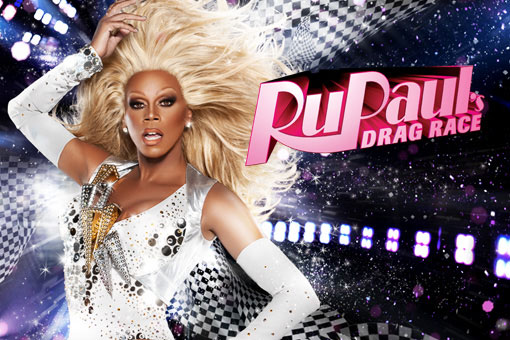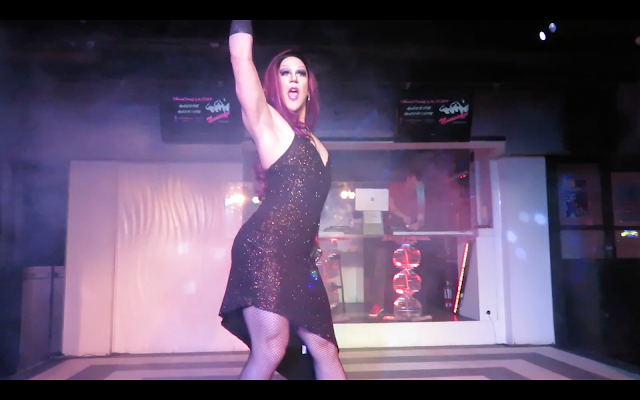Drag as Competition
Drag is not a contact sport, but should it be a competition?
RuPaul's Drag Race is a TV phenomenon, bringing an underground art-form to the forefront of pop culture. Ru herself just won an Emmy, and is nominated for multiple MTV awards. On the show, Ru drives her queens (almost exclusively men dressing up as women) to compete for an ultimate crown of America's Next Drag Superstar. It's a cutthroat, high stakes, sometimes literal race that drives these queens (because there have never been drag kings on it **hint hint Ru**) to their limits, and to the constant critique and ridicule of the judges to fit a certain bill. But RuPaul's drag race is reality TV.
Meanwhile, in my current home of Edmonton, Alberta, Canada, a similar competition is taking place: Alberta's Next Drag Superstar (ANDS), totally not bridging on a copyright violation. Drag performers, not just drag queens (yes folks, Alberta is more progressive and inclusive than Hollywood, what wha!!!!! I seriously never thought I'd say that.) compete to become the reigning queen. Competitions take the form of pre-planned performances and lip sync battles, with the rulings of a judges panel and public voting determining the winner. It's a spectacle for sure, and the performers bring out their best. All the videos can be found on the youtube channel dragging our heels. I love it...despite what I say next (Also, note that I am NOT currently competing due to constraints on my time. Outside point of view here).
Are competitions the best way to showcase drag?
Brief herstory lesson huntyyyyyy:
Cross-dressing has been around for centuries, including it's origin in performance art at a time when women were not permitted to perform on stage in Renaissance England (think Shakespeare). Men, dressed as women, took to the stage to act out the parts meant for female characters in addition to male characters. Oddly, in the same time period, women were also forbidden from the art of Kabuki in the 1600s in Japan. So, if I've managed to pick up any anti-drag readers at some point (I don't know how, but whatever) take note bigots!! This was around LONG before you were born, and even considered one of the greatest arts.
Drag itself did not originate until the 1800s, thought to be coined from the fact that the heavy skirts of the era would literally drag along the stage. So really, it doesn't matter if you have nails, or hair, or whatever, if you're not skirting the floor with your gown, you're not doing "traditional" drag 😂. Turns out by this definition I have not once done traditional drag. Floor length gowns cover your legs and ass...so why would I wear them!?!?!?
Drag's long history has included competition from the birth of the ball and the pageant. Honestly there's too much to talk about here: Watch "Paris is Burning (1990)" and "Pageant (2008)". Both were on Netflix at some point. You might learn something, and even recognise a few names or faces.
See, brief.
These competitions have always been a way for performers to showcase their talent, and for that it is a wonderful use of the forum...but is it still relevant in today's evolving drag scene?
Let's look at some pros and cons.
Pro: Competitions force you to be better.
RuPaul's Drag Race is a TV phenomenon, bringing an underground art-form to the forefront of pop culture. Ru herself just won an Emmy, and is nominated for multiple MTV awards. On the show, Ru drives her queens (almost exclusively men dressing up as women) to compete for an ultimate crown of America's Next Drag Superstar. It's a cutthroat, high stakes, sometimes literal race that drives these queens (because there have never been drag kings on it **hint hint Ru**) to their limits, and to the constant critique and ridicule of the judges to fit a certain bill. But RuPaul's drag race is reality TV.
 |
| Promo art for RuPaul's Drag Race (RuPaul pictured) |
Meanwhile, in my current home of Edmonton, Alberta, Canada, a similar competition is taking place: Alberta's Next Drag Superstar (ANDS), totally not bridging on a copyright violation. Drag performers, not just drag queens (yes folks, Alberta is more progressive and inclusive than Hollywood, what wha!!!!! I seriously never thought I'd say that.) compete to become the reigning queen. Competitions take the form of pre-planned performances and lip sync battles, with the rulings of a judges panel and public voting determining the winner. It's a spectacle for sure, and the performers bring out their best. All the videos can be found on the youtube channel dragging our heels. I love it...despite what I say next (Also, note that I am NOT currently competing due to constraints on my time. Outside point of view here).
Are competitions the best way to showcase drag?
Brief herstory lesson huntyyyyyy:
Cross-dressing has been around for centuries, including it's origin in performance art at a time when women were not permitted to perform on stage in Renaissance England (think Shakespeare). Men, dressed as women, took to the stage to act out the parts meant for female characters in addition to male characters. Oddly, in the same time period, women were also forbidden from the art of Kabuki in the 1600s in Japan. So, if I've managed to pick up any anti-drag readers at some point (I don't know how, but whatever) take note bigots!! This was around LONG before you were born, and even considered one of the greatest arts.
 |
| Male kabuki artist |
Drag itself did not originate until the 1800s, thought to be coined from the fact that the heavy skirts of the era would literally drag along the stage. So really, it doesn't matter if you have nails, or hair, or whatever, if you're not skirting the floor with your gown, you're not doing "traditional" drag 😂. Turns out by this definition I have not once done traditional drag. Floor length gowns cover your legs and ass...so why would I wear them!?!?!?
Drag's long history has included competition from the birth of the ball and the pageant. Honestly there's too much to talk about here: Watch "Paris is Burning (1990)" and "Pageant (2008)". Both were on Netflix at some point. You might learn something, and even recognise a few names or faces.
See, brief.
These competitions have always been a way for performers to showcase their talent, and for that it is a wonderful use of the forum...but is it still relevant in today's evolving drag scene?
Let's look at some pros and cons.
Pro: Competitions force you to be better.
- - Competitions, in their nature, are meant to have winners and losers. Competitors strive towards the goal of WINNING. No serious competitor enters with a lesser goal. Those who say they don't aim to win are not entering the competition to compete. This drive for the ultimate goal forces competitors to push themselves to try new things, go outside their boxes, and eventually become better than they were before. Competitions help you to grow.
Con: Drag is art, not sport
- - Art by nature is subjective. Everyone will create, and interpret it differently. However despite what some may say, there ARE guidelines, but only to the techniques involved. This is how art can be taught in schools, and people can learn to become makeup artists. The use of makeup, dance, song, costume design, are all teachable skills. They take practise, example, and have structure that holds them within their guidelines. What allows art to be art, is the combination of these skills to CREATE something. Usually the final creation, not the method of creation, is the art people get to interpret (although I did see an exhibit at an art gallery once where the art piece was a video of someone building, and then deconstructing, a piece of art made solely from Ikea materials, so there's that). Interpretation is not a fair form of judgement, because everyone interprets differently. Don McLean still hasn't told anyone what American Pie is really about, because it doesn't matter. Everyone is free to interpret his art in whichever way they desire, and love or hate it as they will.
- - ...to include other genders, non-genders, surrealistic interpretations of people, animals, and other creations of the mind. This is the result of acceptance and awareness, but mostly of creative minds, which competitions bring to the forefront. When there is so much of the same, you won't stand out unless you strive to be different. Bring something new to the frame, and people will pause to look at the picture.
Con: Competitions can be deconstructive
- - Someone has to be considered better, for there to be a winner. This can have the dual effect of raising one person up, and knocking another person down. This is why participation medals have become such a big thing recently for youth sport. It avoids the aftermath of knocking someone down by praising effort over success. Whether or not this is a good idea is a different discussion entirely. If you want to hear a rant...buy me a gin and ginger (please do it, I spent too much money on heels and wigs, and I would like to be able to drink still). But back to the point. When a subjective art is judged, you are putting personal opinion above talent as a ranking method, unless you are specifically judging the technique, which is highly unlikely at a drag competition because you aren't walking up to them, sticking your nose in their face and looking at their blending skills (although I'd find that hilarious).
- - This is even more of a problem when the competition is based on vote, and not judging. Voting, is, and always will be, a popularity contest. Yes, there are people who vote for whom they think is best, which is how it's SUPPOSED to work, but more often than not better performers get tossed aside, and made to think they're lesser, because people vote for other reasons outside talent. Just because you like them, doesn't mean they deserve to win. Just because you hate them, doesn't mean they deserve to lose.
It's probably pretty clear in which direction I lean on this topic, but I do believe that competitions have their place in drag history. Pageants are a great setting because they are specifically designed to showcase and judge talent in a relatively impartial manner, because they stick to a traditional format of drag. Balls were similar, having specific categories and goals for their drag, or non-drag contestants. Modern competitions, especially those including the evolving drag scene, need to do the same:
Evolve.
Anyways, the message I want to leave you with after this outpouring of thought is:
In the same way that Tyra brought the men to America's Next Top Model, will Ru bring the other genders to RuPaul's drag race? Hmmmmmmm....


Comments
Post a Comment